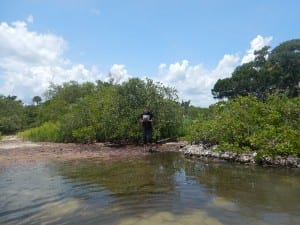Saving Shorelines
Melinda Donnelly won best PhD student presentation at the Conference on Ecological and Ecosystem Restoration (CEER) for her research and work to preserve shorelines.
According to their website, CEER is a Collaborative Effort of the leaders of the National Conference on Ecosystem Restoration (NCER) and the Society for Ecological Restoration (SER). The conference brought together ecological and ecosystem restoration scientists and practitioners to address challenges and share information about restoration projects, programs, and research from across North America and around the globe.
Donnelly did her presentation on a project she has been working on as part of her dissertation. At Canaveral National Seashore, New Smyrna Beach she has been working with Biology Professor Dr. Linda Walters, UCF students and community volunteers to construct living shorelines in areas experiencing severe erosion.
The location for her project was Turtle Mound, a Native American shell midden.
“The archeological artifacts were at risk of washing away because of erosion along the shoreline,” Donnelly said. “Living shorelines use native plants and animals to stabilize shorelines and prevent erosion instead of artificial solutions such as seawalls.”
This year was the first time Donnelly had attended the international conference which had over 1,000 attendees. She said that she felt extremely honored winning best PhD student presentation and it emboldens her to continue.
“It encourages me to continue sharing my research at conferences,” Donnelly said. “Publishing and sharing your results is extremely important in science and receiving this type of recognition as a student shows me I am being successful in sharing my research with others.”
Donnelly’s experience is exactly what the CEER set out to do. One of the main goals of the conference is to enable students and professionals to discuss their ideas and the lessons they learned in the past and from ongoing restoration efforts.
Sharing their findings and being recognized for the effort they put in helps encourage researchers across the globe to continue to combat ecological degradation.

